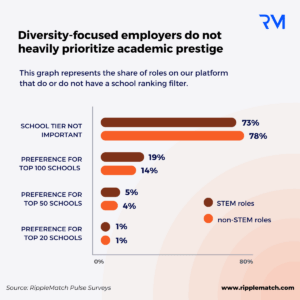GPAs have historically been thought of as one of the best ways to measure a candidate’s readiness and potential to excel in the workforce, oftentimes serving as an initial screening criterion for internships and job applications. However, forward-thinking employers today are recognizing that academic prestige alone does not necessarily guarantee success in the workplace. In fact, many companies are shifting their focus toward a more holistic approach to recruitment, placing less emphasis on GPAs and instead valuing diverse candidates who bring a wide range of skills, experiences, and perspectives to the table.
To get a sense for how recruiters from top employers are approaching Gen Z hiring in 2023, we analyzed a year’s worth of data on our platform featuring thousands of recruiter users from Spring 2022 to Spring 2023. See below for what we’ve found about the diminishing significance of GPA as employers seek to build inclusive and dynamic teams:
How does GPA relate to diversity recruiting?
While GPA is often used as a screening tool, solely relying on it can inadvertently exclude diverse candidates who may have faced unique challenges or attended institutions with fewer resources. Recognizing this, many companies, including those with with campus recruiting strategies, are adopting more inclusive approaches to diversity recruiting, considering a broader range of factors such as experiences, skills, and potential.
In fact, we have found that recruiters on our platform, a strong majority of whom have shifted away from GPA requirements and a focus on school-tier, are building early career talent pipelines with a diverse slate of talent. Specifically, we found that the median share of underrepresented identities (which we define as candidates who identify as URM, female, non-binary, or LGBTQ) in our platform user’s pipelines is 81%, and employers in the top 75th percentile for diversity recruiting have a talent pipeline in which 90% of candidates are an underrepresented identity
What minimum GPAs are recruiters looking for?
Our platform data featuring more than 1,600 recruiters revealed that while the average minimum GPA for STEM roles was 3.65, and the average minimum GPA for non-STEM roles was 3.58, only a small share of roles on our platform actually had a GPA qualification attached. Specifically, we found that just 12% of STEM roles had a minimum GPA requirement with the qualifications, as well as just 9% of non-STEM opportunities. In other words, we discovered that recruiters on our platform do not place a large emphasis on GPA, enabling them to diversify their talent pipelines with a more holistic approach to recruitment.
Does school tier matter to recruiters today?
Similar to GPA requirements, we found that recruiters on our platform are also not heavily prioritizing academic prestige when it comes to what schools they recruit from. Specifically, we found that a strong majority of recruiters on our platform have chosen to source from all the colleges and universities represented within our candidate network, with less than 20% of employers choosing to source from the top 50 or 20 schools for non-STEM roles as defined by U.S. News on their school ranking lists.
Looking closer, we found that 73% of roles on our platform for STEM candidates do not have a school ranking filter, as well as 78% of non-STEM roles. We also found that just 1% of recruiters on our platform are looking for students at the top 20 schools. This data set furthers the trend we’ve discovered that employers today are shifting their approach to how they think about workplace readiness and ability, with a strong focus on reaching untapped talent at lesser-known schools and institutions such as HBCUs, HSIs, and MSIs. In fact, our candidate network represents more than 310 HBCUs and HSIs, and 75% of candidates identify with one or more underrepresented groups.
As the professional landscape continues to evolve, the emphasis on GPA is diminishing, making room for a more inclusive and nuanced approach to identifying and nurturing talent. Employers and recruiters are recognizing that academic performance alone does not necessarily translate into success in the workplace, and the evolving job market demands a more holistic evaluation of candidates, taking into account their practical skills, relevant experiences, and the ability to adapt to changing dynamics. While GPAs still hold some value, they are now being viewed as just one piece of the puzzle. The focus is shifting towards a more comprehensive assessment that considers diverse talents, unique perspectives, and a candidate’s potential for growth.
Looking to learn more about how recruiters are approaching Gen Z hiring today? Download our new report featuring data on the early career recruitment landscape, including an analysis of your competitions’ behavior when it comes to recruitment and hiring.

















